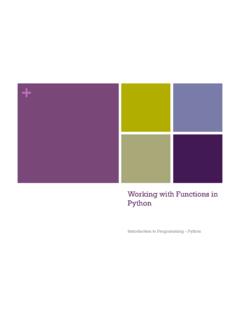Transcription of Introduction to Parallel Programming with MPI and OpenMP
1 Introduction to Parallel Programming with MPI and OpenMPCharles AugustineOctober 29, 2018 Goals of Workshop Have basic understanding of Parallel Programming MPI OpenMP Run a few examples of C/C++ code on Princeton HPC systems. Be aware of some of the common problems and pitfalls Be knowledgeable enough to learn more (advanced topics) on your ownParallel Programming AnalogySource: No free lunch - can t just turn on Parallel Parallel Programming requires work Code modification always Algorithm modification often New sneaky bugs you bet Speedup limited by many factorsRealistic Expectations Ex. Your program takes 20 days to run 95% can be parallelized 5% cannot (serial) What is the fastest this code can run? As many CPU s as you want!1 day!Amdahl s Law As you consider Parallel Programming understanding the underlying architecture is important Performance is affected by hardware configuration Memory or CPU architecture Numbers of cores/processor Network speed and architectureComputer ArchitectureMPI and OpenMP MPI Designed for distributed memory Multiple systems Send/receive messages OpenMP Designed for shared memory Single system with multiple cores One thread/core sharing memory C, C++, and Fortran There are other options Interpreted languages with multithreading python , R, matlab(have OpenMP & MPI underneath) CUDA, OpenACC(GPUs) Pthreads, Intel CilkPlus (multithreading) OpenCL, Chapel, Co-array Fortran, Unified Parallel C (UPC)
2 MemoryCPUM emoryCPUM essageMessageMemoryCPUCPUCPUCPUMPIOpenMP MPI Message Passing Interface Standard MPI-1 Covered here MPI-2 Added features MPI-3 Even more cutting edge Distributed Memory But can work on shared Multiple implementations exist Open MPI MPICH Many commercial (Intel, HP, ) Difference should only be in the compilation not development C,C++, and FortranMPI Program -BasicsInclude MPI Header FileStart of Program(Non-interacting Code)Initialize MPIRun Parallel Code &Pass MessagesEnd MPI Environment(Non-interacting Code)End of ProgramMPI Program BasicsInclude MPI Header FileStart of Program(Non-interacting Code)Initialize MPIRun Parallel Code &Pass MessagesEnd MPI Environment(Non-interacting Code)End of Program#include < >intmain (intargc, char *argv[]) {MPI_Init(&argc.)}
3 // Run Parallel (); // End MPI Envirreturn 0;}Basic Environment Initializes MPI environment Must be called in every MPI program Must be first MPI call Can be used to pass command line arguments to all Terminates MPI environment Last MPI function callMPI_Init(&argc , &argv) MPI_Finalize() Communicators & Rank MPI uses objects called communicators Defines which processes can talk Communicators have a size MPI_COMM_WORLD Predefined as ALL of the MPI Processes Size= Nprocs Rank Integer process identifier 0 Rank< Size Basic Environment Cont. Returns the rank of the calling MPI process Within the communicator, comm MPI_COMM_WORLD is set during Init(..) Other communicators can be created if needed Returns the total number of processes Within the communicator, commintmy_rank, size;MPI_Init(&argc, MPI_Comm_rank(MPI_COMM_WORLD, MPI_Comm_size(MPI_COMM_WORLD, MPI_Comm_rank(comm, &rank) MPI_Comm_size(comm, &size) Hello World for MPI#include< >#include< >intmain(intargc, char*argv[]) {intrank, size;MPI_Init(&argc, //initialize MPI libraryMPI_Comm_size(MPI_COMM_WORLD, //get number of processesMPI_Comm_rank(MPI_COMM_WORLD, //get my process id//do somethingprintf("Hello World from rank %d\n", rank);if (rank == 0) printf("MPI World size = %d processes\n", size);MPI_Finalize(); //MPI cleanupreturn0.))))))
4 }Hello World Output 4 processes Code ran on each process independently MPI Processes have privatevariables Processes can be on completely different machinesHello World from rank 3 Hello World from rank 0 MPI World size = 4 processesHello World from rank 2 Hello World from rank 1 How to Compile @ Princeton Intel (icc) and GNU (gcc) compilers Which to use? gccfree and available everywhere Often iccis faster This workshop uses icc. MPI compiler wrapper scripts are used Loaded through module command Different script for each language (C, C++, Fortan)Compile & Run Code[user@adroit4]$ module load [user@adroit4]$ hello_world_mpi[user@adroit4]$ mpirun np 1 ./hello_world_mpiHello World from rank 0 MPI World size = 1 processesLanguageScript NameCmpiccC++mpic++,mpiCC, mpicxxFortranmpif77, mpif90 Use the --showmeflag to see details of wrapperOnly needed once in a on head node For head/login node testing NOT for long running or big tests Small (<8 procs) and short (<2 min)[user@adroit4]$ mpirun-np 4.
5 /hello_world_mpiHello World from rank 0 MPI World size = 4 processesHello World from rank 1 Hello World from rank 2 Hello World from rank 3 Start an mpijobWith this number of processesRun this executableCompute NodesLogin Node(s)Shared StorageSchedulerSubmitting to the Scheduler Run on a compute node essentially a different computer(s) Scheduler: SLURM Tell SLURM what resources you need and for how long Then tell it what to do srun= run an MPI job on a SLURM cluster It will call mpirun np <n> but with better performance#!/bin/bash#SBATCH --ntasks4 #4 mpitasks#SBATCH -t 00:05:00 #Time in HH:MM:SS#set up environmentmodule load #Launch job with srunnot mpirun/mpiexec! sure environment is the same as what you compiled with!Lab 1: Run Hello World Program Workshop materials are ~ sshto Run on head node[user@adroit4]$ wgethttp.
6 //tigress-web/~ [user@adroit4]$ tar xvf [user@adroit4]$cd bootcamp[user@adroit4 bootcamp]$ module load [user@adroit4 bootcamp]$ o hello_world_mpi[user@adroit4 bootcamp]$ mpirun np 6 hello_world_mpi[user@adroit4 bootcamp]$ [user@adroit4 bootcamp]$ cat Submit a job to the scheduler look at outputSome Useful SLURM CommandsCommandPurpose/Functionsbatch<filename>Submit thejob in <filename> to slurmscancel<slurmjobid>Cancel runningor queued jobsqueue u <username>Show username s jobs in the queuesalloc<resources req d>Launchan interactivejob on a compute node(s)Point-to-Point Communication Send a message Returns only after buffer is free for reuse (Blocking) Receive a message Returns only when the data is available Blocking Two way communication BlockingProcess 0 SendbufProcess 1 Recvbufbuf{code}{code}{code}MPI_Recv(&bu f , count, datatype, source, tag, comm , &status)MPI_Send(&buf , count, datatype, dest , tag, comm) MPI_SendRecv(.)
7 Point-to-Point Communication Blocking Only returns after completed Receive: data has arrived and ready to use Send: safe to reuse sent buffer Be aware of deadlocks Tip: Use when possible Non-Blocking Returns immediately Unsafe to modify buffers until operation is known to be complete Allows computation and communication to overlap Tip: Use only when neededDeadlockProcess 0 SendbufaProcess 1 Recv{code}SendRecvbufb Blocking calls can result in deadlock One process is waiting for a message that will never arrive Only option is to abort the interrupt/kill the code (ctrl-c) Might not always deadlock - depends on size of system bufferProcess 0 SendbufaProcess 1 Recv{code}RecvSendbufb{code}{code}bufbbu faDangerousCollective Communication Communication between 2 or more processes 1-to -many, many-to -1, many-many All processes call the same function with same arguments data sizes must match Routines are blocking (MPI-1)Collective Communication (Bcast)
8 Broadcasts a message from the root process to all other processes Useful when reading in input parameters from fileRootDataProcessProcessProcessProcess MPI_Bcast(&buffer, count, datatype, root, comm )Collective Communication (Scatter) Sends individual messages from the root process to all other processesRootDataRootProcessProcessProce ssDataDataDataMPI_Scatter(&sendbuf, sendcnt, sendtype, &recvbuf, recvcnt, recvtype, root, comm )Collective Communication (Gather) Opposite of ScatterRootDataRootProcessProcessProcess DataDataDataMPI_Gather(&sendbuf, sendcnt, sendtype, &recvbuf, recvcnt, recvtype, root, comm)Collective Communication (Reduce) Applies reduction operation on data from all processes Puts result on root processRootRootProcessProcessProcessoper atorOperatorMPI_SUMMPI_MAXMPI_MINMPI_PRO DMPI_Reduce(&sendbuf, &recvbuf, count, datatype,mpi_operation, root, comm)Collective Communication (Allreduce) Applies reduction operation on data from all processes Stores results on all processesProcessProcessProcessProcessOpe ratorMPI_SUMMPI_MAXMPI_MINMPI_PRODP rocessProcessProcessProcessoperatorMPI_A llreduce(&sendbuf, &recvbuf, count, datatype, mpi_operation, comm )Collective Communication (Barrier) Process synchronization (blocking) All processes forced to wait for each other Use only where necessary Willreduce parallelismMPI_Barrier(comm)
9 Process0 Process1 Process2 Process3 BarrierProcess0 Process1 Process2 Process3 Useful MPI RoutinesRoutinePurpose/FunctionMPI_InitI nitialize MPI MPI_FinalizeClean up MPIMPI_Comm_sizeGet sizeof MPI communicatorMPI_Comm_RankGet rank of MPI CommunicatorMPI_ReduceMin, Max, Sum, etcMPI_BcastSend messageto everyoneMPI_AllreduceReduce,but store result everywhereMPI_BarrierSynchronizeall tasks by blocking MPI_SendSend a message (blocking)MPI_RecvReceivea message (blocking)MPI_IsendSend a message (non-blocking)MPI_IrecvReceivea message (non-blocking)MPI_WaitBlocks until message is completed(Some) MPI data TypesMPIC data TypeMPI_INTS ingedintMPI_FLOATF loatMPI_DOUBLED oubleMPI_CHARS igned charMPI_SHORTS igned short intMPI_LONGS ignedlong intA note about MPI Errors Examples have not done any error handling Default: MPI_ERRORS_ARE_FATAL This can be changed to MPI_ERRORS_RETURN Not recommended Program must handle ALL errors correctly Does have a purpose in fault tolerance Long running jobs should always checkpoint in case of Situation 1: 5 nodes, 20 cores per node = 100 processes 4 weeks of total run time broken down into 14, 48-hour runs 100 x 14 x 48 = 672,000 core-hours Situation 2: 3,000 nodes, 20 cores per node = 60,000 processes One 12 hour job 60,000 x 12 = 720,000 core-hoursHardware Errors Unfortunately, hardware fails.
10 Nodes die, switches fail In case of a hardware or software error, the program aborts If you aren t checkpointingALLtime for current job is wasted Situation 1: one 4,800 core-hours job lost Situation 2: all 720,000 core-hours lost If you are checkpointingall computation from last checkpoint is lost Situation 1: core-hours per minute since last checkpoint Situation 2: 1000 core-hours per minute since last checkpointIntro to Parallel ProgrammingSection 2: OpenMP (and ) OpenMP What is it? Open Multi-Processing Completely independent from MPI Multi-threadedparallelism Standard since 1997 Defined and endorsed by the major players Fortran, C, C++ Requires compiler to support OpenMP Nearly all do For shared memory machines Limited by available memory Some compilers support GPUsPreprocessor Directives Preprocessor directives tell the compiler what to do Always start with # You ve already seen one.




